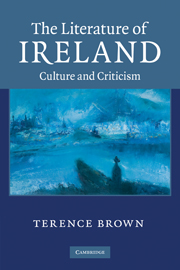Book contents
- Frontmatter
- Contents
- Acknowledgements
- Introduction
- 1 The Literary Revival: historical perspectives
- 2 Joyce's magic lantern
- 3 Music: the cultural issue
- 4 Modernism and revolution: rereading Yeats's ‘Easter 1916’
- 5 Shakespeare and the Irish self
- 6 Irish literature and the Great War
- 7 Ireland, Modernism and the 1930s
- 8 Post-modernists: Samuel Beckett and Flann O'Brien
- 9 Patrick Kavanagh: religious poet
- 10 MacNeice's Irelands: MacNeice's islands
- 11 Louis MacNeice and the Second World War
- 12 MacNeice and the puritan tradition
- 13 John Hewitt and memory: a reflection
- 14 Michael Longley and the Irish poetic tradition
- 15 Seamus Heaney: the witnessing eye and the speaking tongue
- 16 Derek Mahon: the poet and painting
- 17 Telling tales: Kennelly's Cromwell and Muldoon's ‘The More a Man Has the More a Man Wants’
- 18 Redeeming the time: John McGahern and John Banville
- 19 ‘Have we a context?’: transition, self and society in the theatre of Brian Friel
- 20 Hubert Butler and nationalism
- 21 The Irish Dylan Thomas: versions and influences
- Index
- References
14 - Michael Longley and the Irish poetic tradition
Published online by Cambridge University Press: 05 June 2012
- Frontmatter
- Contents
- Acknowledgements
- Introduction
- 1 The Literary Revival: historical perspectives
- 2 Joyce's magic lantern
- 3 Music: the cultural issue
- 4 Modernism and revolution: rereading Yeats's ‘Easter 1916’
- 5 Shakespeare and the Irish self
- 6 Irish literature and the Great War
- 7 Ireland, Modernism and the 1930s
- 8 Post-modernists: Samuel Beckett and Flann O'Brien
- 9 Patrick Kavanagh: religious poet
- 10 MacNeice's Irelands: MacNeice's islands
- 11 Louis MacNeice and the Second World War
- 12 MacNeice and the puritan tradition
- 13 John Hewitt and memory: a reflection
- 14 Michael Longley and the Irish poetic tradition
- 15 Seamus Heaney: the witnessing eye and the speaking tongue
- 16 Derek Mahon: the poet and painting
- 17 Telling tales: Kennelly's Cromwell and Muldoon's ‘The More a Man Has the More a Man Wants’
- 18 Redeeming the time: John McGahern and John Banville
- 19 ‘Have we a context?’: transition, self and society in the theatre of Brian Friel
- 20 Hubert Butler and nationalism
- 21 The Irish Dylan Thomas: versions and influences
- Index
- References
Summary
Michael Longley's forty-year career as a poet has represented a complex engagement (in which his awareness of English poetic modes has played a vital part) with the Irish poetic tradition. His work has in fact illuminated, extended and in crucial respects helped to redefine that tradition in quiet, subtle, unforced but intriguing ways.
To begin with, in his oeuvre lines of association with other Irish poets can be detected that have made his writing life a distinctive yet deeply rooted contribution to late twentieth-century Irish poetry. This essay will initially seek to trace those threads as they wind through Longley's poetry, his prose writings and the interviews he has given over the course of the years. It will then reflect on the way Longley has made English modes amenable to Irish experience in ways that extend the possibilities of the Irish poetic tradition.
A feature of Longley's earliest enthusiasms as a poet was an exuberant eclecticism. As he emerged as promising poet at Trinity College, Dublin, in the late 1950s and early 1960s, after a period of literary inhibition at his Belfast grammar school (Royal Belfast Academical Institution) valued Rugby and getting-on in the Belfast way of the period), he read voraciously. He took the English tradition and contemporary verse as a whole as his proper field of engagement. In this he was aided and abetted by a well-informed companion who took him ‘with joy’ on an exciting voyage of discovery, a wide-ranging, engagingly unscheduled, poetic grand tour.
- Type
- Chapter
- Information
- The Literature of IrelandCulture and Criticism, pp. 178 - 189Publisher: Cambridge University PressPrint publication year: 2010

